Category: books
You are viewing all posts from this category, beginning with the most recent.
Henri Nouwen: An alert and aware spiritual life
Currently reading Henri Nouwen’s Reaching Out: The Three Movements of the Spiritual Life. What a wonderful little book! This bit in particular hit home today:
Not too long ago a priest told me that he cancelled his subscription to the New York Times because he felt that the endless stories about war, crime, power games, and political manipulation only disturbed his mind and heart and prevented him from meditation and prayer.
That is a sad story because it suggests that only by denying the world can you live in it, that only by surrounding yourself by an artificial, self-induced quietude can you live a spiritual life. A real spiritual life is exactly the opposite: it makes us so alert and aware of the world around us, that all that is and happens becomes part of our contemplation and meditation and invites us to a free and fearless response.
As timely in 2024 as it was when Nouwen wrote it in 1975. And I both understand the plight of the priest in his story and desire to have, as Nouwen says, a free and fearless response to all that happens around me.
2024 Reads: Making All Things New by Ilia Delio

Making All Things New is the most complete and succinct compilation of Delio’s theology and philosophy that I’ve encountered so far. She’s strongest in her call to bring our theology into alignment with modern cosmology, and in exploring how the human brain works and interacts with others. (Let’s not forget she’s got a PhD in pharmacology, after all, and was doing research on ALS or Parkinson’s or something.)
I still think she’s way too bought into Kurzweil’s singularity and transhumanism, but I’ll forgive her that because I think the rest of it is bang on. Very manageable at 200 pages.
Lamb of the Free by Andrew Remington Rillera
I have a small handful of theological books in my past that I look back on as turning points - books that spoke to me at my particular place and time, opened my eyes, and set my thinking about God in a new direction. The first of those is NT Wright’s Surprised By Hope; the second is Ilia Delio’s The Unbearable Wholeness of Being. I’ll give it a week or two before I inscribe this in stone, but I’m inclined to think that Andrew Rillera’s Lamb of the Free is the next one. Let me try to explain.
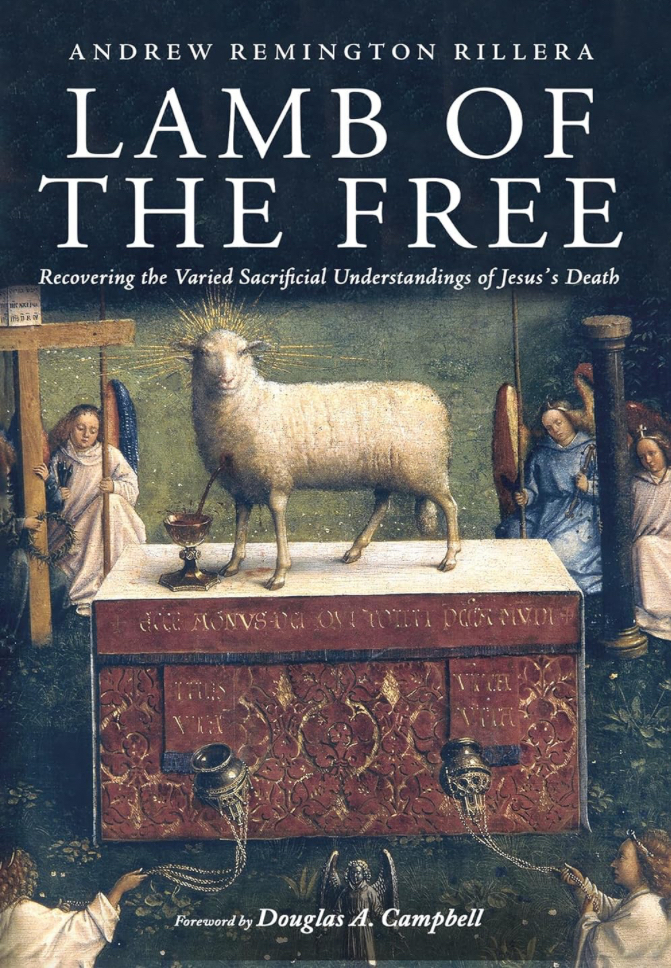
In the Protestant church (at least), there has been much ink spilled over the years to systematize atonement theories, that is, to organize all the teaching about Jesus’ death and how it works to save us into some sort of coherent, synthesized framework. In the conservative evangelical world of my first 40 years as a Christian, the predominant, nay, the only acceptable atonement theory is penal substitutionary atonement, usually abbreviated PSA. PSA says that each of us, as a sinner, deserve God’s punishment, but that Jesus died in our place, taking that wrath upon himself. The children’s bibles usually summarize it as “Jesus died so I don’t have to”.
Rillera says that PSA fails to pay attention to how sacrifices worked in the Old Testament, and as such then horribly misreads the New Testament (particularly Paul and Hebrews). This may be the book that inspires me to go back to where I always get bogged down in the Bible In A Year reading plans, and do a close reading of Leviticus.
Rillera starts right off the bat in chapter 1 by making the assertion that
There is no such thing as a substitutionary death sacrifice in the Torah.
He notes that “for sins that called for capital punishment, of for the sinner to be “cut off”, there is no sacrifice that can be made to rectify the situation”, and that far from animal blood on the altar being a substitute for human blood, human blood actually defiled the altar rather than purifying it. Neither was that animal sacrifice about the animal suffering; to maltreat the animal “would be to render it ineligible to be offered to God”, no longer being “without blemish”. Already you can see the distinctions being drawn between this close reading of Levitical sacrifices and the usual broad arguments made in favor of PSA.
Lamb of the Free takes 4 chapters - a full 150 pages - to review OT sacrifices. I’m not going to try to summarize it here. But I have a new understanding and appreciation for paying attention to those details now! Then in chapter 5 he turns the corner to talk about Jesus, and summarizes his arguments thusly:
(1) According to the Gospels, Jesus’s life and ministry operated entirely consistent with and within OT purity laws and concern for the sanctuary.
(2) Jesus was a source of contagious holiness that nullified the sources of the major ritual impurities as well as moral impurity.
(3) Thus, Jesus was not anti-purity and he was not rejecting the temple per se.
(4) Jesus’ appropriation of the prophetic critique of sacrifice fits entirely within the framework of the grave consequences of moral impurity. That is, like the prophets, Jesus is not critiquing sacrifice per se, but rather moral impurity, which will cause another exile and the destruction of the sanctuary.
(5) But, his followers will be able to experience the moral purification he offers.
(6)The only sacrificial interpretation of Jesus’s death that is attributed to Jesus himself occurs at the Lord’s Supper. At this meal Jesus combines two communal well-being sacrifices… to explain the importance of his death. However, the notion of kipper [atonement] is not used in any of these accounts…
There’s a lot there, and Rillera unpacks it through the second half of the book. (I was particularly enthusiastic at his point (2), as it dovetails neatly with Richard Beck’s Unclean, where Beck argues that Jesus’ holiness was of such a quality that indeed, sin didn’t stick to him, but rather his holiness “stuck to”, and purified, other people’s sin and sickness.) Rillera says that Jesus’ death conquered death because even death was transformed by Jesus’ touch, and that Jesus came and died not as a substitution but rather as a peace offering from God to humankind. (His unpacking of Romans 3:25-26 and the word hilastērion was particularly wonderful here.) Jesus’ suffering under sin and death was in solidarity with humankind, and uniquely served to ultimately purify humankind from death and sin. (Really, I’m trying to write a single blog post here and summarize a 300 page book. If you’ve gotten this far and you’re still interested, go buy the book and read it. If you want to read it but it’s too pricy for you, let me know and I’ll send you a copy. I’m serious.)
I’ll wrap this up with a beautiful paragraph from a chapter near the end titled “When Jesus’s Death is Not a Sacrifice”. In examining 1 Peter 2, Rillera says this:
First Peter says that Jesus dies as an “example so that you should follow his steps”. In short, Jesus’s death is a participatory reality; it is something we are called to follow and share in experientially ourselves. The logic is not: Jesus died so I don’t have to. It is: Jesus died (redeeming us from slavery and forming us into a kingdom of priests in 2:5, 9) so that we, together, can follow in his steps and die with him and like him; the just for the unjust (3:18) and trusting in a God who judges justly (2:23; 4:19). This is what it means to “suffer…for being a ‘Christian’” (4:15-16). It does not particularly matter why a Christ-follower is suffering or being persecuted; it only matters that they bear the injustice of the world in a Christ-like, and therefore, a Servant-like manner.
There are a dozen other bits I’d love to share - maybe in another post soon. But for now, I’m thankful for Andrew Remington Rillera and his wonderful work in Lamb of the Free. I’ll be thinking about this for a long time.
2024 Reads: A Window to the Divine by Zachary Hayes, OFM
I just finished up a slow read of a wonderful little book. A Window to the Divine: Creation Theology by Franciscan theologian Zachary Hayes draws from Teilhard and Whitehead to suggest that we need to recognize that our approach to synthesizing modern science and creation theology needs some updating. As he notes,
…the worldview mediated to both believer and unbeliever alike by our modern culture is radically different from that which provided some key structural elements for our familiar theological vision and language.
After all, he asks,
If scientific or prescientific views of the world inter into the structure of a theology in some way, and if believers forget where a style of theology has come from and what elements have entered into its structure, what would one expect to happen when the scientific vision of the world begins to change?
In the first chapter, Hayes examines the relationship between theology and science, noting that they exist to answer very different sorts of questions. They need not exist in opposition to each other, he says.
…we will not expect science to prove faith claims, nor will we expect theology to prove the claims of science. But we will attempt to allow religious faith to express itself in terms relevant to its cultural context, which, at least in the Western world of the present, is strongly conditioned by scientific insights.
Hayes goes on to briefly examine the creation texts, suggesting a theological interpretation of the beginning of Genesis that is focused far more on God as the source and origin of creation rather than on a scientific explanation of how things came into being. He takes a chapter to discuss the origin of humans (all from Adam? or from multiple parents?) and how that view interacts with Romans 5. (As in Adam all sinned, so in Christ all will be saved…) Hayes suggests that these texts, too, should be read etiologically, that is, as discussing the cause or origin of sin and salvation, not of some literal genetic propagation of sinfulness. He bogs down a bit in a very Roman Catholic discussion of Original Sin, trying to briefly address both Augustine and the Council of Trent.
The last chapter, though, is worth the whole read, as he pulls the threads together. I will quote more liberally here, it’s just too good.
First, about sin:
Human history is a history of response, both negative and positive, to the lure of God’s love… Sin is not a mere infringement of a law extrinsic to our nature. It is a failure to realize the potential of our nature itself. If our nature is fundamentally a potential to expand, sin is a contraction… Sin is the resistance to expansion through union with others. It is the attempt to create human history in alienation from the only end that we ultimately have… Sin is a failure in the collaborative effort to move toward full personalization in human community.
And then regarding grace:
The history of God’s grace and human response finds a distinctive form of self-consciousness in the history of the Bible, and an unsurpassed level of realization in the person and destiny of Jesus Christ… God, who is love community, calls forth love community in creation through free response of human persons to the offer of divine grace.
And then, finally, about the relation of theology and science, and why it matters:
Theology need not fear science nor tremble before the power of reason. Rather both theology and science need to stand in awe in the face of the mystery that is our world and in the even greater mystery of God to which the world points…
We have no reason to assume that the mere fact of human life is the goal of the universe. What is important above all is a quality of life, not the mere fact of life. With this in mind, we can see that it is a more significant question to ask whether this sort of world is apt for the accomplishment of God’s purpose. It is, indeed, a cosmos that challenges humanity in mind and in will, and that is capable of eliciting both awe and wonder. It is a cosmos that draws humanity out of the narrow point from which it begins to expand to the mystery of the world and thus to move towards the Ground of the world. It is a world apt to stretch the finite spirit to the limits of its possibility to bring forth not only the fact of life, but a Godlike quality of life that is a created sharing in the loving thought of God from which the whole of creation emerges.
Beautiful stuff.
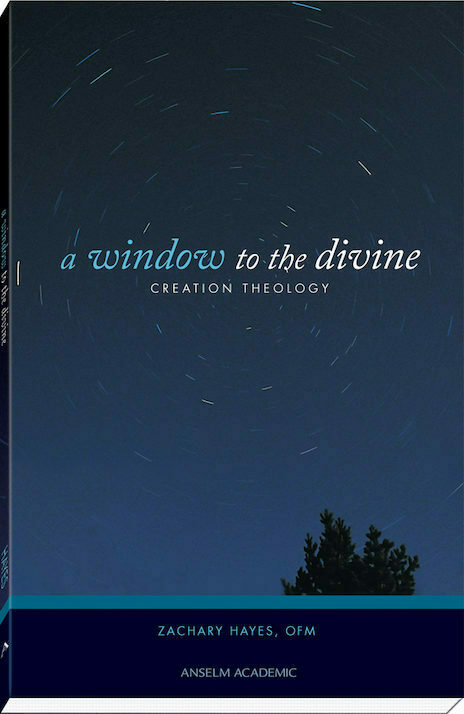
Finished reading: Reading Genesis by Marilynne Robinson
I wasn’t sure what to expect from Robinson writing on Genesis, but I enjoy her writing enough it was definitely something I was going to read. Structured as a narrative commentary, Robinson doesn’t employ chapter breaks or other touchpoints within the text itself. It’s fascinating to read a commentary by a Christian writer who takes the text seriously but not necessarily literally. If there is a broad “point” to her book, it is to feature the uniqueness of Genesis among the Ancient Near Eastern texts, and to highlight the theme of unmerited grace that runs through it. From God’s forgiveness of Cain to Joseph’s forgiveness of his brothers, Robinson tells us that Genesis is set apart from the other ANE texts this way.
I appreciated her book, but didn’t enjoy it as much as reading her essays. I need to pick them up for a re-read.
The Exvangelicals by Sarah McCammon
I just finished up reading Sarah McCammon’s new book The Exvangelicals and I need to take the time to recommend it here. McCammon, a 40-something NPR journalist, has written a book that’s part memoir and part explainer on where Exvangelicals have come from over the past decade, and, more importantly, why.
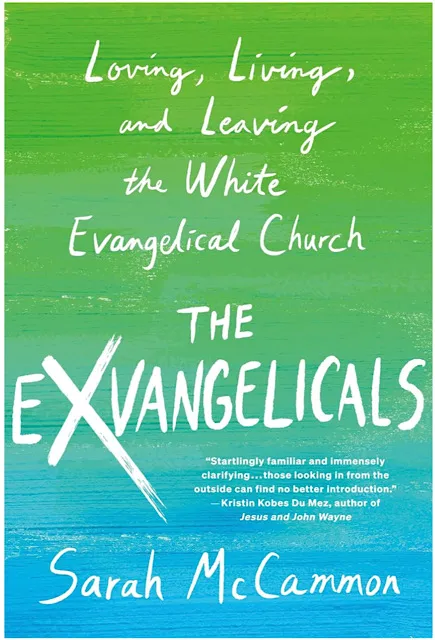
When I reviewed Tim Alberta’s The Kingdom, the Power, and the Glory earlier this year, I noted at the time that he was joining a list of kindred spirits who I found online or by reading their books, and who turned out to be fellow devout homeschooled kids who grew into adults questioning evangelical distinctives and dismayed by the devolution of white American evangelicalism into Fox News-watching Republican sheep. I named McCammon at this point as another one of those people. Little did I know how familiar her story would be.
I first encountered Sarah McCammon when she was a host on Iowa Public Radio. Eventually I followed her on Twitter, and continued to read and occasionally interact with her as she moved from Iowa to the east coast, eventually to work directly for NPR. Her reporting during the 2016 presidential campaign was nuanced and insightful. In hindsight, I should’ve known why.
In The Exvangelicals, McCammon unpacks her own story and uses it to illustrate the Exvangelical movement. She’s a few years younger than I am, but our stories run parallel tracks: growing up in the Midwest, a devout churchgoing family, culturally sheltered, homeschooled, evangelical youth groups, marrying young, eventually finding her own faith torn as she experienced the wider world. Eventually she left the church and faith fervor of her youth, getting divorced, becoming an Episcopalian, marrying a Jewish man. Despite so much Evangelical rhetoric saying the Exvangelicals are only leaving because they want to be free to enjoy sin, McCammon recognizes that it’s actually really painful:
Leaving conservative evangelicalism means giving up the security of silencing some of life’s most vexing and anxiety-inducing questions with a set of “answers” - about the purpose of life, human origins, and what happens after death. It also means losing an entire community of people who could once be relied on to help celebrate weddings and new babies, organize meal trains when you’re sick or bereaved, and provide a built-in network of support and socialization around a shared set of expectations and ideals.
It’s often felt, for me, like a choice between denying my deepest instincts about truth and morality to preserve that community, or being honest with myself and the rest of the world and risking that loss.
She has summed up there in a single sentence my experience of the last dozen years.
It was interesting reading this book back-to-back with Lyz Lenz’s This American Ex-Wife. Lyz is another exvangelical, though I don’t know she’d describe herself that way, who writes with an acerbic fire about coming through her evangelical upbringing and a troubled marriage. (Lyz actually provides one of the blurbs on the back of McCammon’s book.) McCammon’s prose is more NPR, Lyz is more shock jock. McCammon makes me comfortably say “yes, this! Exactly this!”. Lyz makes me uncomfortably say “well, she’s not wrong…” They are both important voices whose words should be read and wrestled with.
The Exvangelicals is a book I would recommend for anyone outside the evangelical experience trying to understand where us weirdos are coming from, and for any one of us Exvangelical weirdos who wants to feel less alone.
Recommended Reading: The Kingdom, The Power, and The Glory by Tim Alberta
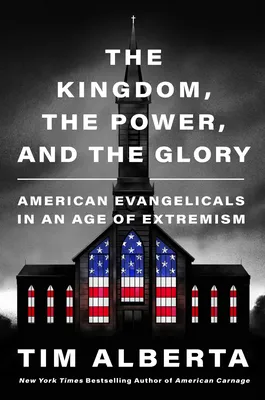
My first completed book of the year is one I can wholeheartedly recommend: The Kingdom, The Power, and The Glory by Tim Alberta. Subtitled “American Evangelicals in an Age of Extremism”, journalist Alberta’s book details his many interviews with American Evangelical leaders since the rise of Trump in 2016. He interrogates their motivations, how their words align with their actions, and how those words and actions comport with the teachings of Jesus.
Alberta is uniquely positioned to write a book like this. A professional journalist currently with The Atlantic, he has also written for, among others, Politico and The Wall Street Journal. But, as he reveals in the book’s initial chapters, he is also a pastor’s kid. His father, up until his untimely death, was the pastor of a large Evangelical Presbyterian church in Michigan. Alberta grew up a devoted Christian within that church, and continues today as a professing Christian. The Kingdom, The Power, and The Glory at places verges on memoir. But Alberta’s fluency with evangelical language, teaching, and culture give him an insight and authority that other journalists would lack.
If you have been following along in the Evangelical culture wars post-2016, most of the folks Alberta discusses will be familiar. He introduces them chapter by chapter: The Falwells and Liberty University, Robert Jeffress, and the Southern Baptist Convention. Firebrands like Greg Locke. Unabashed politicos like Ralph Reed. Fradulent historian David Barton. SBC stalwart-turned-outcast Russell Moore. Journalist Julie Roys. Pastor Brian Zahnd as a Midwestern prosperity preacher turned lonely prophet.
Whether it’s on purpose or just so close to home (for both the author and me) that Alberta couldn’t avoid it, the theme of children of Evangelicals turning and becoming their parents’ reproof played over and over through the book. Nick Olson, the son of an early Liberty student who came back to teach, only to be driven away when his politics didn’t align. Rachael Denhollender, the conservative homeschooled gymnast who, after bravely testifying against her abuser, became an advocate for sexual abuse victims within her own denomination. Cameron Strang, CEO of Relevant magazine, the son of a religious huckster. Jonathan Falwell, at a crossroads after taking over leadership of the “family business”, Liberty University. Alberta finally questions his own actions and motivations. Would he have been willing to ask these questions, to write this book, were his father still alive and in the pastorate? That question remains forever unknown. I understand, at least a little bit, Alberta’s quandary.
Over the past decade a pattern has emerged for me. When I encounter someone from my generation, usually online, who speaks with a resonant voice of sanity about America’s religion and politics, it turns out they, like me, grew up evangelical, usually homeschooled, and have spent their adult lives forging a path out. I’m thinking of people like author Lyz Lenz, new NYT film critic Alissa Wilkinson, writer and editor (and Alissa’s former podcast-hosting sidekick) Sam Thielman, NPR journalist Sarah McCammon, and famous lawyer spouse Jacob Denhollander, kindred spirits all. I’m now going to add Tim Alberta to that list.
At the end of the book, Alberta expresses an uncertain hope that this younger generation is successfully turning the evangelical world away from the worst of its political debauchery. To my mind, that jury is still out. Leader after leader throughout the book express their befuddlement and confusion as to why so much of the Evangelical church has been willing to follow political prophets away from the call of Jesus. Like them, Alberta doesn’t have the answer. But with this book, he has done what he can: incontrovertably documenting the political corruption of the American Evangelical church for anyone willing to read it.
My 2023 Reading in Review
Another year full of books! (Previous summaries: 2022, 2021, 2020, 2019, 2018, 2017, 2016, 2015, 2014, 2013, 2012, 2011, 2010, 2009, 2008, 2007…
I read 72 books for the year, which feels like a nice even number. There’s still a lot of theology and science fiction in the list, but I read more science this year, along with several memoirs.
Here’s the full list of reading, with particular standouts noted in bold:
Theology
- Out of the Embers: Faith After the Great Deconstruction by Bradley Jersak
- On the Soul and the Resurrection by St. Gregory of Nyssa
- Reparations: A Christian Call for Repentance and Repair by Duke L. Kwon
- Sanctifying Interpretation: Vocation, Holiness, and Scripture by Chris E. W. Green
- The Peaceable Kingdom: A Primer in Christian Ethics by Stanley Hauerwas
- Art and Faith: A Theology of Making by Makoto Fujimura
- Not All Who Wander (Spiritually) Are Lost by Traci Rhodes
- A Hidden Wholeness: The Journey Toward an Undivided Life by Parker J. Palmer
- Trauma-Informed Evangelism: Cultivating Communities of Wounded Healers by Charles Kiser
- Christ in Evolution by Ilia Delio
- Breathing Under Water: Spirituality and the Twelve Steps by Richard Rohr
- The Phenomenon of Man by Pierre Teilhard de Chardin
- The New Being by Paul Tillich
Green is wonderful here. I posted a few excerpts while reading it that would be a good introduction.
Science and History
- The Evolution of Knowledge: Rethinking Science for the Anthropocene by Jurgen Renn
- Unmasking Autism: Discovering the New Faces of Neurodiversity by Devon Price
- Fundamentals of Software Architecture: An Engineering Approach by Mark Richards
- Mindsight: The New Science of Personal Transformation by Daniel J. Siegel
- The Technology Trap: Capital, Labor, and Power in the Age of Automation by Carl Benedikt Frey
- Out of the Wreckage: A New Politics in the Age of Crisis by George Monbiot
- The Book of Genesis: A Biography by Ronald Hendel
- Digging Up Armageddon: The Search for the Lost City of Solomon by Eric H. Cline
- Secular Faith: How Culture Has Trumped Religion in American Politics by Mark Alan Smith
- Until the End of Time: Mind, Matter, and Our Search for Meaning in an Evolving Universe by Brian Greene
- The Book of Job: A Biography by Mark Larrimore
- On the Origina of Time: Stephen Hawking’s Final Theory by Thomas Hertog
- Quantum Reality by Nick Herbert
- The Talmud: A Biography by Barry Scott Wimpfheimer
- The Case Against Reality: Why Evolution Hid the Truth from Our Eyes by Donald D. Hoffman
Memoir and Biography
- Every Good Boy Does Fine: A Love Story, in Music Lessons by Jeremy Denk
- Still Just a Geek: An Annotated Memoir by Wil Wheaton
- Agent Josephine: American Beauty, French Hero, British Spy by Damien Lewis
- Heretic: A Memoir by Jeanna Kadlec
- Joel on Software by Joel Spolsky
- God on the Rocks: Distilling Religion, Savoring Faith by Phil Madeira
- All My Knotted-Up Life: A Memoir by Beth Moore
- Mystics and Zen Masters by Thomas Merton
- Birth of a Dancing Star: My Journey from Cradle Catholic to Cyborg Christian by Ilia Delio
- How Far the Light Reaches: A Life in Ten Sea Creatures by Sabrina Imbler
- Being Heumann: An Unrepentant Memoir of a Disability Rights Activist by Judith Heumann
- Making It So: A Memoir by Patrick Stewart
I posted some appreciation for Stewart before I got my hands on his memoir. The memoir did not disappoint. He’s an imperfect, lovely man. The book was a pleasure to read. Also, he’s a great example of why we need funding for arts and arts education. But I digress.
Other Miscellaneous Non-Fiction
- My Bright Abyss by Christian Wiman
- Oscar Wars: A History of Hollywood in Gold, Sweat, and Tears by Michael Schulman
- The Ultimate Quest: A Geek’s Gude to (The Episcopal) Church by Jordan Haynie Ware
- Transitions: Making Sense of Life’s Changes by William Bridges
Fiction
- The Three-Body Problem by Liu Cixin (re-read)
- A Closed and Common Orbit by Becky Chambers (re-read)
- Dead Lions by Mick Herron
- Don’t Cry for Me by Daniel Black
- The Passenger by Cormac McCarthy
- The Bayern Agenda by Dan Moren
- Record of a Spaceborn Few by Becky Chambers
- Tomorrow, and Tomorrow, and Tomorrow by Gabrielle Zevin
- Hunting Time by Jeffrey Deaver
- Ordinary Monsters by J. M. Miro
- The Mountain in the Sea by Ray Nayler
- The Morning Star by Karl Ove Knausgard
- Babel by R. F. Kuang
- Translation State by Ann Leckie
- Average Jones by Samuel Hopkins Adams
- The Odyssey by Homer, trans. Emily Wilson
- Red Queen by Juan Gomez-Jurado
- The Left Hand of Darkness by Ursula K. Le Guin
- The Fifth Season by N. K. Jemisin
- Blackouts by Justin Torres
- Starter Villain by John Scalzi
- The Testament of Mary by Colm Toibin
- Girl One by Sara Flannery Murphy
- Titanium Noir by Nick Harkaway
- My Old Home: A Novel of Exile by Orville Schell
- The Helsinki Affair by Anna Pitoniak
- Time’s Mouth by Edan Lepucki
- The Collector by Daniel Silva
Schell’s epic story following a young man’s life growing up in 20th century China is beautiful and tragic and very worth the read.
Summary
One of my goals from previous years was to read fewer books written by white guys. By my count, 24 of this year’s books meet that goal… which isn’t as good as I’d hoped it would be. That science section didn’t help in that regard. I made a stronger shift this year, though, away from theology and to science. That wasn’t super-intentional, but just where my interest was at the time.
On to 2024! I’m nearly halfway through my first book of the year.
Supernatural love, found within human love
Christian Wiman, from his book My Bright Abyss:
It is not some meditative communion with God that I crave. What one wants during extreme crisis is not connection with God, but connection with people; not supernatural love, but human love. No, that is not quite right. What one craves is supernatural love, but one finds it only within human love.
This is why I am, such as I am, a Christian, because I can feel God only through physical existence, can feel his love only in the love of other people. I believe in grace and chance, at the same time. I believe in absolute truth and absolute contingency, at the same time. And I believe that Christ is the seam soldering together these wholes that our half vision — and our entire clock-bound, logic-locked way of life — shapes as polarities.
> My Bright Abyss, p. 164
Beautiful, and it resonates for me with the stuff I was reading from Chris Green a couple weeks ago — that the world experiences God’s love through us in the way God makes space for them in our lives.
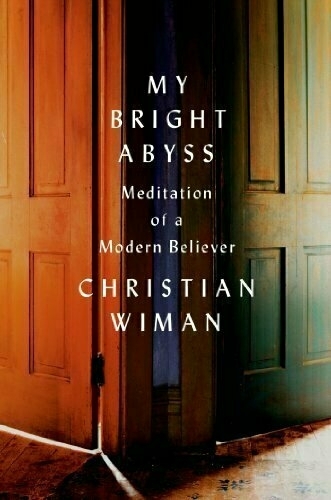
A little poetry for Monday night
I’ve done a lot of reading so far this year. Tonight I started My Bright Abyss: Meditation of a Modern Believer by Christian Wiman. I’m not too far in but the writing (prose, punctuated with poetry) is dense and profound.
In the opening chapter he drops this little poem that resounds with truth in my ears. I leave it here for you as a gift.
Into the instant’s bliss never came one soul
Whose soul was not possessed by Christ,
Even in the eons Christ was not.
And still: some who cry the name of Christ
Live more remote from love
Than some who cry to a void they cannot name.
– ‘After Dante’, Christian Wiman